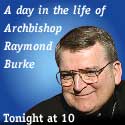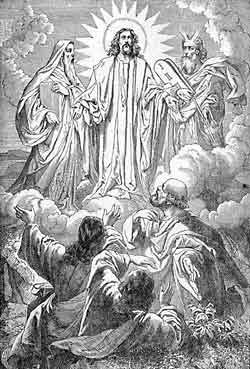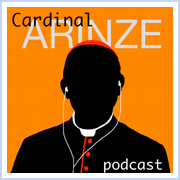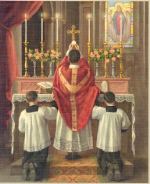Luke 15:1-3; 11-32Parables of God's Mercy[1] Now the tax collectors and sinners were all drawing near to hear Him (Jesus). [2] And the Pharisees and the scribes murmured, saying, "This man receives sinners and eats with them."
The Prodigal Son[3] So He told them this parable: [11] "There was a man who had two sons; [12] and the younger of them said to his father, `Father, give me the share of property that falls to me.' And he divided his living between them. [13] Not many days later, the younger son gathered all he had and took his journey into a far country, and there he squandered his property in loose living. [14] And when he had spent everything, a great famine arose in that country, and he began to be in want. [15]So he went and joined himself to one of the citizens of that country, who sent him into his fields to feed swine. [16] And he would gladly have fed on the pods that the swine ate; and no one gave him anything. [17] But when he came to himself he said, `How can many of my father's hired servants have bread enough and to spare, but I perish here with hunger! [18] I will arise and go to my father, and I will say to him, "Father, I have sinned against Heaven and before you; [19] I am no longer worthy to be called your son; treat me as one of your hired servants.'" [20] And he arose and came to his father. But while he was yet at a distance, his father saw him and had compassion, and ran and embraced him and kissed him. [21] And the son said to him, `Father, I have sinned against Heaven and before you; I am no longer worthy to be called your son.' [22] But the father said to his servants, `Bring quickly the best robe, and put it on him; and put a ring on his hand, and shoes on his feet; [23] and bring the fatted calf and kill it, and let us eat and make merry; [24] for this my son was dead, and is alive again; he was lost, and is found.' And they began to make merry.
[25] "Now his elder son was in the field; and as he came and drew near to the house, he heard music and dancing. [26] And he called one of the servants and asked what this meant. [27] And he said to him, `Your brother has come, and your father has killed the fatted calf, because he has received him safe and sound.' [28] But he was angry and refused to go in. His father came out and entreated him, [29] but he answered his father, `Lo, these many years I have served you, and I never disobeyed your command; yet you never gave me a kid, that I might make merry with my friends. [30] But when this son of yours came, who has devoured your living with harlots, you killed for him the fatted calf!' [31] And he said to him, `Son, you are always with me, and all that is mine is yours. [32] It was fitting to make merry and be glad, for this your brother was dead, and is alive; he was lost, and is found.'"
**********************
Commentary:
1-32. Jesus' actions manifest God's mercy: He receives sinners in order to convert them. The scribes and Pharisees, who despised sinners, just cannot understand why Jesus acts like this; they grumble about Him; and Jesus uses the opportunity to tell these Mercy parables. "The Gospel writer who particularly treats of these themes in Christ's teaching is Luke, whose Gospel has earned the title of `the Gospel of mercy'" ([Pope] John Paul II, "Dives In Misericordia", 3).
In this chapter St. Luke reports three of these parables in which Jesus describes the infinite, fatherly mercy of God and His joy at the conversion of the sinner.
The Gospel teaches that no one is excluded from forgiveness and that sinners can become beloved children of God if they repent and are converted. So much does God desire the conversion of sinners that each of these parables ends with a refrain, as it were, telling of the great joy in Heaven over a sinner who repents.
1-2. This is not the first time that publicans and sinners approach Jesus (cf. Matthew 9:10). They are attracted by the directness of the Lord's preaching and by His call to self-giving and love. The Pharisees in general were jealous of His influence over the people (cf. Matthew 26:2-5; John 11:47) a jealousy which can also beset Christians; a severity of outlook which does not accept that, no matter how great his sins may have been, a sinner can change and become a saint; a blindness which prevents a person from recognizing and rejoicing over the good done by others. Our Lord criticized this attitude when He replied to His disciples' complaints about others casting out devils in His name: "Do not forbid him; for no one who does a mighty work in My name will be able soon after to speak evil of Me" (Mark 9:39). And St. Paul rejoiced that others proclaimed Christ and even overlooked the fact they did so out of self-interest, provided Christ was preached (cf. Philippians 1:17-18).
11. This is one of Jesus' most beautiful parables, which teaches us once more that God is a kind and understanding Father (cf. Matthew 6:8; Romans 8:15; 2 Corinthians 1:3). The son who asks for his part of the inheritance is a symbol of the person who cuts himself off from God through sin. "Although the word `mercy' does not appear, this parable nevertheless expresses the essence of the divine mercy in a particularly clear way" ([Pope] John Paul II, "Dives In Misericordia", 5).
12. "That son, who receives from the father the portion of the inheritance that is due him and leaves home to squander it in a far country `in loose living', in a certain sense is the man of every period, beginning with the one who was the first to lose the inheritance of grace and original justice. The analogy at this point is very wide-ranging. The parable indirectly touches upon every breach of the covenant of love, every loss of grace, every sin" ("Dives In Misericordia", 5).
14-15. At this point in the parable we are shown the unhappy effects of sin. The young man's hunger evokes the anxiety and emptiness a person feels when he is far from God. The prodigal son's predicament describes the enslavement which sin involves (cf. Romans 1:25; 6:6; Galatians 5:1): by sinning one loses the freedom of the children of God (cf. Romans 8:21; Galatians 4:31; 5:13) and hands oneself over the power of Satan.
17-21. His memory of home and his conviction that his father loves him cause the prodigal son to reflect and to decide to set out on the right road. "Human life is in some way a constant returning to our Father's house. We return through contrition, through the conversion of heart which means a desire to change, a firm decision to improve our life and which, therefore, is expressed in sacrifice and self-giving. We return to our Father's house by means of that sacrament of pardon in which, by confessing our sins, we put on Jesus Christ again and become His brothers, members of God's family" ([St] J. Escriva, "Christ is Passing By", 64).
20-24. God always hopes for the return of the sinner; He wants him to repent. When the young man arrives home his father does not greet him with reproaches but with immense compassion, which causes him to embrace his son and cover him with kisses.
20. "There is no doubt that in this simple but penetrating analogy the figure of the father reveals to us God as Father. The conduct of the father in the parable and his whole behavior, which manifests his internal attitude, enables us to rediscover the individual threads of the Old Testament vision of mercy in a synthesis which is totally new, full of simplicity and depth. The father of the prodigal son is FAITHFUL TO THIS FATHERHOOD, FAITHFUL TO THE LOVE that he had always lavished on his son. This fidelity is expressed in the parable not only by his immediate readiness to welcome him home when he returns after having squandered his inheritance; it is expressed even more fully by that joy, that merrymaking for the squanderer after his return, merrymaking which is so generous that it provokes the opposition and hatred of the elder brother, who had never gone far away from his father and had never abandoned the home.
"The father's fidelity to himself [...] is at the same time expressed in a manner particularly charged with affection. We read, in fact, that when the father saw the prodigal son returning home `he had COMPASSION, ran to meet him, threw his arms around his neck and kissed him.' He certainly does this under the influence of a deep affection, and this also explains his generosity towards his son, that generosity which so angers the elder son" ("Dives In Misericordia", 6).
"When God runs towards us, we cannot keep silent, but with St. Paul we exclaim, "ABBA PATER": `Father, my Father!' (Romans 8:15), for, though He is the creator of the universe, He doesn't mind our not using high-sounding titles, nor worry about our not acknowledging His greatness. He wants us to call Him Father; He wants us to savor that word, our souls filling with joy [...].
"God is waiting for us, like the father in the parable, with open arms, even though we don't deserve it. It doesn't matter how great our debt is. Just like the prodigal son, all we have to do is open our heart, to be homesick for our Father's house, to wonder at and rejoice in the gift which God makes us of being able to call ourselves His children, of really being His children, even though our response to Him has been so poor" ([St] J. Escriva, "Christ Is Passing By", 64).
25-30. God's mercy is so great that man cannot grasp it: as we can see in the case of the elder son, who thinks his father loves the younger son excessively, his jealousy prevents him from understanding how his father can do so much to celebrate the recovery of the prodigal; it cuts him off from the joy that the whole family feels. "It's true that he was a sinner. But don't pass so final a judgment on him. Have pity in your heart, and don't forget that he may yet be an Augustine, while you remain just another mediocrity" ([St] J. Escriva, "The Way", 675).
We should also consider that if God has compassion towards sinners, He must have much much more towards those who strive to be faithful to Him. St. Therese of Lisieux understood this very well: "What joy to remember that our Lord is just; that He makes allowances for all our shortcomings, and knows full well how weak we are. What have I to fear then? Surely the God of infinite justice who pardons the prodigal son with such mercy will be just with me `who am always with Him'?" ("The Story of a Soul", Chapter 8).
32. "Mercy, as Christ has presented it in the parable of the prodigal son, has THE INTERIOR FORM OF THE LOVE that in the New Testament is called AGAPE. This love is able to reach down to every prodigal son, to every human misery, and above all to every form of moral misery, to sin. When this happens, the person who is the object of mercy does not feel humiliated, but rather found again and `restored to value'. The father first and foremost expresses to him his joy, that he has been `found again' and that he has `returned to life'. This joy indicates a good that has remained intact: even if he is a prodigal, a son does not cease to be truly his father's son; it also indicates a good that has been found again, which in the case of the prodigal son was his return to the truth about himself" ("Dives In Misericordia", 6).
***************
Source: "The Navarre Bible: Text and Commentaries". Biblical text taken from the Revised Standard Version and New Vulgate. Commentaries made by members of the Faculty of Theology of the University of Navarre, Spain. Published by Four Courts Press, Kill Lane, Blackrock, Co. Dublin, Ireland.
Reprinted with permission from Four Courts Press and Scepter Publishers, the U.S. publisher.











